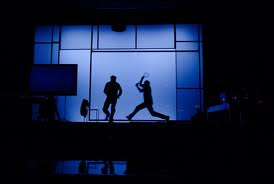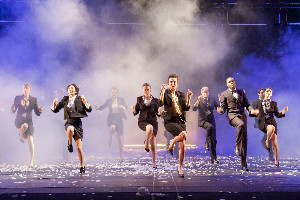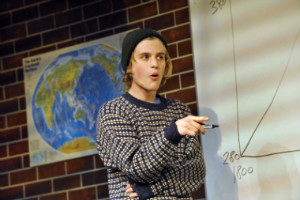Can you stage the inconceivable? Does theatre have particular qualities that might help people comprehend concepts and phenomena so much bigger than ourselves that we struggle to even articulate them in words? These are the questions that have most been on my mind as I’ve contemplated the onslaught of climate change-themed plays that have hit London stages this year. From the National Theatre’s multi-authored, elaborately staged Greenland, to Richard Bean’s zinger-laden The Heretic at the Royal Court, to the revival of Filter theatre company’s slick, collaborative piece, Water at the Tricycle, questions about the changing environment, humankind’s role in that change, and what can possibly be done about it have been difficult for theatre-goers in London to avoid of late. And it’s not out of nowhere: since 2009 a number of other global-warming-themed dramas, including Steve Waters’ two-play series The Contingency Plan at the Bush, and Mike Bartlett’s Earthquakes in London, also at the National Theatre, formed a trickle that built to the current downpour.
This is clearly more than a coincidence of programming: it indicates a serious engagement on the part of British theatres and theatre artists to conceptualise, to somehow materialise, one of the most pressing – but intangible – phenomena facing humankind today. One could argue that material evidence of climate change is everywhere – in changing weather patterns, rising temperatures, melting polar ice caps, and so forth – but there are scientists and other experts who continue to argue that these phenomena are overplayed and not connected to human-generated climate change. Another problem is that of representing phenomena that are broadly spread across time and space and hard to understand as necessarily related. As Robert Butler has argued in The Economist’s ‘More Intelligent Life’ blog, to transport science to the stage, a playwright must not only clarify complicated ideas for laypeople, but also evoke the tension of cause and effect. The problem with climate change is that what happens in one place often ends up affecting people in an entirely different place, and at a remote time. The two worlds can seem unrelated. Where's the catalyst for drama?
What we have, in other words, are the interrelated challenges of negotiating big picture/little picture, and presence/absence – challenges that apply not only to staging climate change, but to making theatre in the global age more broadly. How can an art form that is inherently tied to a specific time and place communicate phenomena, feelings, and ideas that defy easy comprehension? With extreme difficulty, is the simple answer, which is probably why we rarely see attempts to put God on stage. It’s more achievable to dramatise the lives of mortals as they grapple in the face of the unknown: hence the long history of plays about religion and the religious, and hence, here, plays about scientists and politicians defining, defending, denying, placing blame for, and legislating about, climate change. Every play I’ve seen or read in the climate change category features one or more such characters, and certain stock types have emerged, in particular the BlackBerry-addicted, relationship-challenged female policy wonk, and the disenfranchised, aging male scientist as prophet of doom.
.jpg.aspx) Character types, then, are one way that artists are coping with this subject matter; beyond that – and this is what really interests me – the formal approaches diverge considerably. With The Heretic, Richard Bean has gone the formally conservative route, in attempting to construct a well-made climate change play. This is not, in Bean’s hands at least, a winning strategy. His central character is Dr. Diane Cassell (Juliet Stevenson), an earth scientist whose research shows that water levels in the Maldives are not rising, and who therefore becomes increasingly well-known as a climate change denier (I do have to give credit to Bean for bucking the gender trend by making his pissed-off scientist a woman). Diane’s one-on-one tutorials with bright fresher Ben, quarrels with her department head (and former lover) Kevin, and a recorded Newsnight interview (with Paxo himself), are Bean’s means of communicating the play’s science to the viewer.
Character types, then, are one way that artists are coping with this subject matter; beyond that – and this is what really interests me – the formal approaches diverge considerably. With The Heretic, Richard Bean has gone the formally conservative route, in attempting to construct a well-made climate change play. This is not, in Bean’s hands at least, a winning strategy. His central character is Dr. Diane Cassell (Juliet Stevenson), an earth scientist whose research shows that water levels in the Maldives are not rising, and who therefore becomes increasingly well-known as a climate change denier (I do have to give credit to Bean for bucking the gender trend by making his pissed-off scientist a woman). Diane’s one-on-one tutorials with bright fresher Ben, quarrels with her department head (and former lover) Kevin, and a recorded Newsnight interview (with Paxo himself), are Bean’s means of communicating the play’s science to the viewer.
But it’s clear even in the very funny first half that Bean doesn’t trust this scientific material as compelling subject matter, since he keeps throwing additional plot points and themes into the frame: academic politics; death threats to Diane from militant environmentalists; Diane’s anorexic daughter Phoebe’s nascent relationship with Ben; Kevin’s attempts to rekindle his romance with Diane. The play spirals out of control in the second act, which becomes a sort of academic thriller and very nearly a hostage drama before collapsing into a heap of humanist sentimentality, with whatever points Bean may have been trying to make about the science lost in the dramaturgical rubble. That the Royal Court’s artistic management let this mess onto their stage seems evidence of a desire to jump onto the climate change drama bandwagon, or, perhaps, to defy expectations by mounting a play with relatively right-of-centre politics. It also seems remarkable that the production received glowing reviews from most of London’s mainstream critics, but that may come down to the form: the play is recognisable as an old-style issue-based comedy-drama, which may have felt to some critics like a comfort zone.
 Filter’s Water and the National Theatre’s Greenland, by contrast, have the look and feel of devised theatre, in that they rely on visual and physical means as well as text to communicate meaning; feature multiple, overlapping plotlines, and use personal stories as metaphors for the larger issue at hand. In the case of Water, though, it’s the little stories that dominate: climate change is not engaged with in its substance but rather used as a plot device to prompt crises and personal revelations for the characters in its two overlapping (but never connecting) plot lines. Claudia (Victoria Moseley) is a political advisor on the environment, having problems with her estranged boyfriend, an ambitious deep cave diver. Ferdy Roberts plays both Graham, a depressive English civil servant, and his recently deceased father, a scientist who was an early predictor of climate change but buried his findings for a pay-off. The stories are communicated in bits and pieces, and jump back and forth in time, held together by some bravura staging techniques (lots of sliding glass panels, projections, silhouette work, and live onstage sound design by Tim Phillips). Just what the company is trying to say via the fragmentary nature of this storytelling is hard to grasp, however; as a science play, it feels insubstantial, and as a relationship play, overly cool.
Filter’s Water and the National Theatre’s Greenland, by contrast, have the look and feel of devised theatre, in that they rely on visual and physical means as well as text to communicate meaning; feature multiple, overlapping plotlines, and use personal stories as metaphors for the larger issue at hand. In the case of Water, though, it’s the little stories that dominate: climate change is not engaged with in its substance but rather used as a plot device to prompt crises and personal revelations for the characters in its two overlapping (but never connecting) plot lines. Claudia (Victoria Moseley) is a political advisor on the environment, having problems with her estranged boyfriend, an ambitious deep cave diver. Ferdy Roberts plays both Graham, a depressive English civil servant, and his recently deceased father, a scientist who was an early predictor of climate change but buried his findings for a pay-off. The stories are communicated in bits and pieces, and jump back and forth in time, held together by some bravura staging techniques (lots of sliding glass panels, projections, silhouette work, and live onstage sound design by Tim Phillips). Just what the company is trying to say via the fragmentary nature of this storytelling is hard to grasp, however; as a science play, it feels insubstantial, and as a relationship play, overly cool.
Greenland, for its part, is shambolic and frequently on the edge of incomprehensibility, but I warmed to it nonetheless, because its formal ambition and sheer scale feel like a genuine attempt to grapple with the subject matter. Four writers contributed to the script, but signs of collaboration are not apparent: as in Water, individual plot lines overlap and run simultaneously but never join up. A young woman leaves university to become a radical environmental activist. A working class lad who we first see being patronised in his Oxford entrance interview becomes an activist engaged with the effects of the melting polar ice cap. A scientist with alarming evidence of the existence of climate change falls in love with the Labour Party’s environmental advisor. This latter storyline ends up being the most engaging, thanks to some original, quirky writing that both progresses the story of the couple’s flirtation and effectively communicates important scientific information, and also to empathetic performances from Lyndsey Marshall and Irish actor Peter McDonald. This plotline also leads us into the production’s most memorable and provocative passage – a staging of the Copenhagen summit exposing the global realpolitik behind the public-facing negotiations.
 Rising star Bijan Sheibani lays on the directorial fireworks but however immediately diverting, hundreds of empty plastic bottles dropping onto the stage to the sound of ‘It’s Raining Men’; the repeated trope of the full company of fifteen actors walking forward in slow-mo on the vast, bare Lyttleton stage; and a huge storm of shredded paper come off as attempts to mask the work’s disconnectedness. There is something genuinely moving, though, in the play’s layering of scientific information about the destruction of certain environments (in particular the Arctic) coupled with evocations of the animal world: projections of birds fly all over the auditorium walls, and – the evening’s coup de theatre – a gorgeously realistic life-size polar bear gambols slowly across the stage (the puppetry is by Blind Summit’s Mark Down). The ursine visitor’s seeming obliviousness to the activity of theatre – the very wrongness of it being on the stage – makes a subtle and lingering point about the ramifications of human actions in the whole of the natural world.
Rising star Bijan Sheibani lays on the directorial fireworks but however immediately diverting, hundreds of empty plastic bottles dropping onto the stage to the sound of ‘It’s Raining Men’; the repeated trope of the full company of fifteen actors walking forward in slow-mo on the vast, bare Lyttleton stage; and a huge storm of shredded paper come off as attempts to mask the work’s disconnectedness. There is something genuinely moving, though, in the play’s layering of scientific information about the destruction of certain environments (in particular the Arctic) coupled with evocations of the animal world: projections of birds fly all over the auditorium walls, and – the evening’s coup de theatre – a gorgeously realistic life-size polar bear gambols slowly across the stage (the puppetry is by Blind Summit’s Mark Down). The ursine visitor’s seeming obliviousness to the activity of theatre – the very wrongness of it being on the stage – makes a subtle and lingering point about the ramifications of human actions in the whole of the natural world.
I’m frustrated not to have seen Steve Waters’ The Contingency Plan, which certainly reads as the best, by far, of recent climate change dramas (that I’ve been able to engage with – Earthquakes in London is still on my to-read pile). The reason why it’s so good has everything to do with its ingenious form: Waters has found a way to both exploit and exceed the narrative/thematic focus of the well-made play form, by offering two plays about the same situation, which in principle stand alone but, read/viewed together, inform, deepen, and enrich each other.
On the Beach introduces us to aging glaciologist Robin Paxton, who exiled himself to the Norfolk coast with his wife Jenny years ago because of the unpopularity of his ahead-of-the-curve ideas on climate change. His son Will arrives for a visit with his new girlfriend Sarika, a government environment policy officer, who is plumping for Will to get a high-level advisor job. In the eerie second half, several months later, Jenny and Robin are bunkered down at the house, having supper outside, waiting for – something.
Resilence takes us to Whitehall, where government ministers and established scientists work with Will and Sarika to cope with a looming environmental catastrophe – a tidal wave heading straight for the east of England. The play’s politics are as credible as its science, and Waters combines them to enormous effect: We come to believe in the deadly potential of the impending disaster, even as we are caught up in and deeply frustrated by the competitiveness, bureaucracy and dithering that keeps the politicians from acting quickly. At the same time we’ve been invited to care so much about the characters that we can’t shake awareness this oncoming tsunami will first make landfall at Norfolk – where we have left Robin and Jenny suspended in theatrical time, and where they will finally see the accuracy of his science verified in the fact of their certain deaths.
If the high-profile London theatres had really wanted to put their money where their ecological mouth is, some theatrical recycling might have been in order: remounting The Contingency Plan at the National or Royal Court could have saved valuable resources expended on newer, lesser takes on the same material.
 But there’s interesting stuff of contemplation here nonetheless. Climate change, like most important phenomena in the contemporary world, doesn’t tell a straightforward, linear story. It sprawls, it contradicts, it jumps around, it confuses. Putting people on stage trying to cope with these complications is a relatively simple way of turning climate change into theatre. But making the form do what climate change does to human perception – leap in and out of sight, engage and frustrate – seems a more effective and sophisticated technique. The fragmented, non-linear storytelling that devising processes tend to generate, and the incompletion of Steve Waters’ plays if each were to stand alone, invite active spectatorship: struggling to make sense of these productions simulates the experience of contemplating the phenomenon itself. Thought about this way, theatre becomes an important site in contemporary culture, a place where we practice thinking and feeling beyond the linear – where we work on conceiving the inconceivable.
But there’s interesting stuff of contemplation here nonetheless. Climate change, like most important phenomena in the contemporary world, doesn’t tell a straightforward, linear story. It sprawls, it contradicts, it jumps around, it confuses. Putting people on stage trying to cope with these complications is a relatively simple way of turning climate change into theatre. But making the form do what climate change does to human perception – leap in and out of sight, engage and frustrate – seems a more effective and sophisticated technique. The fragmented, non-linear storytelling that devising processes tend to generate, and the incompletion of Steve Waters’ plays if each were to stand alone, invite active spectatorship: struggling to make sense of these productions simulates the experience of contemplating the phenomenon itself. Thought about this way, theatre becomes an important site in contemporary culture, a place where we practice thinking and feeling beyond the linear – where we work on conceiving the inconceivable.
Karen Fricker is deputy London theatre critic with Variety (US) and a lecturer in Contemporary Theatre at Royal Holloway, University of London.